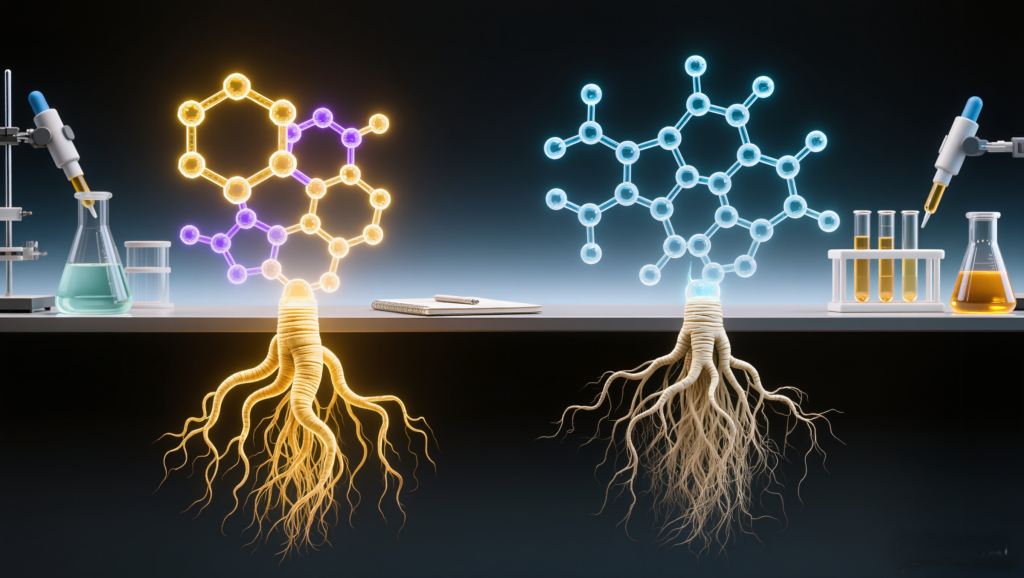健康食品店に行けば、「高麗人参」サプリメントの棚や検索結果が溢れかえっています。しかし、高麗人参はどれも同じではありません!最も一般的でありながら、紛らわしいのが、アジア人参(Panax ginseng)、アメリカ人参(Panax quinquefolius)、シベリア人参(Eleutherococcus senticosus)です。名前やアダプトゲン効果などは同じですが、それぞれの化学的性質、用途、そして効果は驚くほど異なります。ここでは、科学的根拠に基づいたガイドで、それぞれの違いを分かりやすく解説し、賢く選んでいただけるようお手伝いします。
高麗人参:オタネニンジン「真の高麗人参」について
アジア人参(Panax ginseng)
原産地:韓国、中国、シベリアの一部
有効成分:ジンセノサイド(主成分)、多糖類、ペプチド、フラボノイド
主な特性:より辛く、刺激が強いとされています。スタミナ、免疫反応、認知機能を高めます。
伝統的な用途:持久力の向上、疲労回復、心身のパフォーマンス向上、性的健康のサポート。
臨床研究:精神覚醒、血糖値調整、勃起不全、抗炎症作用への効果。
アメリカ人参(Panax quinquefolius)
原産地:北米
有効成分:アジア産のジンセノサイドに類似(構造は様々)
主な特性:よりクールで刺激が少ない。免疫機能をサポートし、血糖値のバランスを整える。長期使用にも優しい。
伝統的な用途:ストレス解消、体温低下、精神明晰、免疫サポート。
シベリア人参:実は高麗人参ではありません!
エゾウコギの違い
学名:Eleutherococcus senticosus(オナックスではありません)
原産地:ロシア、中国北東部、シベリア
有効成分:エレウテロシド(ジンセノシドではありません)
主な効能:アダプトゲン作用、身体的、精神的、環境的ストレスへの抵抗力向上、軽度の刺激作用。
伝統的な用途:風邪やインフルエンザの予防、エネルギーと活力の増強、ストレス下でのパフォーマンス向上、長寿の促進。
臨床研究:社会機能、持久力、精神的/身体的パフォーマンスの向上、白血球反応の活性化が示唆されている。免疫調節作用はありますが、オナックス系よりも強度は弱い。
化学が違いを生む
| 特徴 | アジア/アメリカニンジン(オタネニンジン/パナックス) | シベリアニンジン(エレウテロコッカス・センティコスス) |
|---|---|---|
| 植物分類(科) | パナックス属 | ウコギ科(Araliaceae) |
| 有効成分 | ジンセノサイド(Ginsenosides) | エレウテロサイド(Eleutherosides) |
| アダプトゲンとしての特徴 | 強力だが刺激的(アジア人参)または冷却的(アメリカ人参) | 穏やかでよりバランスの取れた作用 |
| 免疫機能への影響 | 強力で直接的な調整作用(パナックス) | 補助的で穏やかなブースト、間接的な作用 |
| 伝統的利用 | 持久力、集中力、性欲、老化防止、免疫サポート | ストレス耐性、エネルギー、活力、軽度の免疫サポート |
シベリア人参には、オタネニンジンの幅広い効果に関連する主要化合物であるジンセノサイドは含まれていません。代わりに、エレウテロサイドが独自のアダプトゲン効果をもたらしますが、特に心血管機能、性機能、脳機能への生物学的影響は、それほど顕著ではないか、異なる可能性があります。
健康への影響:研究概要
アジア人参とアメリカ人参(オタネニンジン属)
刺激作用または冷却作用が強い(アジア人参はアメリカ人参より強い)。
潜在的な効果:エネルギー、認知機能、性機能(勃起不全)、糖尿病、免疫力、更年期障害の緩和、神経保護作用。
デメリット:高血圧、不眠症、不整脈のある方、または刺激物(主にオタネニンジン)に敏感な方には推奨されません。
シベリア人参
穏やかな「強壮剤」:全体的な回復力とストレス反応を高めることで知られています。慢性疲労、軽い風邪、そして精神的・肉体的な持久力の向上に役立ちます。
研究結果:精神・社会機能と白血球の反応にわずかな改善が見られ、ヘルペス、インフルエンザ、血糖値の調節にも効果がある可能性があります。
安全性:副作用が少なく、オタネニンジンよりも長期使用に適していますが、他のハーブや薬剤との相互作用が生じる可能性があります。
免疫効果:どちらが優れているのでしょうか?
アジア人参/アメリカ人参:免疫活動に直接的な影響を与える傾向があり、インターロイキンとサイトカインの発現を促進します(一部の研究では、より強力な免疫反応をもたらす可能性が示唆されています)。
シベリア人参:適度な免疫調節効果を示し、攻撃的な免疫因子を増加させるのではなく、主に適応と白血球の反応を通じて抵抗力を高めます。
強力な免疫刺激を求める場合は、オタネニンジンの方が効果的かもしれません。疲労、適応、日常的なストレスには、シベリア人参(エゾウコギ)が好まれることが多いです。
アダプトゲン作用:ストレス、疲労、そしてその先へ
すべての「高麗人参」(オタネニンジンとエゾウコギ)はアダプトゲンとされ、身体が肉体的、精神的、そして代謝的なストレスに対処するのを助けます。しかし、次のような効果があります。
オタネニンジン:激しい仕事、回復、性的な活力など、強い活力を必要とする急性期に最適です。
シベリア人参:長時間労働、度重なるストレス、免疫力の低下、季節性疾患など、慢性的なストレスに静かに寄り添います。
自分に合った高麗人参の選び方
| ゴール | 推奨タイプ | 理由 |
|---|---|---|
| 身体的・精神的な活力向上 | アジア人参(パナックス) | 最も刺激的で、研究実績が豊富 |
| 免疫力・持久力の向上 | アメリカ人参(パナックス) | より冷却的で、長期使用に適する |
| ストレス適応・疲労回復 | シベリア人参(エレウテロ) | 穏やかで安全、長期使用に適する |
| 性的健康 | アジア/アメリカ人参(パナックス) | 強力で伝統的な利用実績 |
| 血糖バランスのサポート | アメリカ人参(パナックス) | 臨床的な裏付けが最も充実している |
重要な注意点
シベリア人参は「本物の人参」ではありません。アジア人参やアメリカ人参に挙げられている効果をすべて期待できるわけではありません。
品質にはばらつきがあるため、用量が明確に記載された標準化されたエキスをお選びください。
相互作用:すべての種類の人参は薬物と相互作用する可能性があります。特に基礎疾患がある場合は、高用量または長期使用の前に医療提供者に相談してください。
まとめ:由来を知る
本物のオタネニンジンとエゾウコギ(シベリア人参)には大きな違いがあります。どちらもハーブ療法や統合的な健康法において重要な役割を果たしますが、その化学的性質、効果、そして伝統的な使用法を理解することで、エネルギー、免疫力、ストレスへの適応、性機能の向上など、あなたの目標に合った適切なサポートを受けることができます。
この記事はいかがでしたか?Youtube, Instagram, Facebook, Pinterest, Twitter (X) でフォローして、ナチュラルヘルスと持続可能なウェルネスに関するその他のコンテンツをご覧ください。








